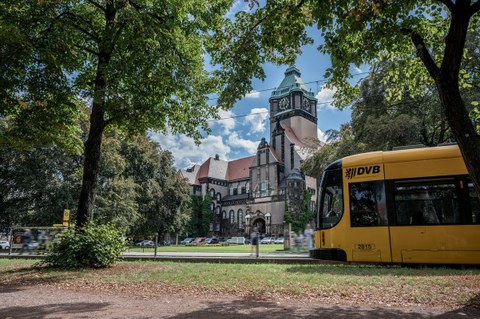Getting to the place of work and study at the university
Table of contents
TU Dresden is easily accessible by various means of transport. Especially by public transport the campus is very well connected (bus 61 and 66, streetcar lines 3, 8, 11, central station as regional connection point). A sufficient number of bicycle parking spaces are available at most of the buildings. Parking for cars is limited on and near the campus.
Traveling with public transportation
Journey planning and timetable information
You will find bus, tram and train timetable information on the following pages:
Timetable information for public transportation in Dresden (DVB)
Timetable information for regional public transportation (VVO)
Timetable information for Deutsche Bahn
For students: Semester tickets
TU Dresden students can make use of the semester ticket. You can also use some Deutsche Bahn trains with this ticket. For more information, visit the Student Council’s website: http://www.stura.tu-dresden.de/semesterticket
For employees: Jobtickets
The Free State of Saxony offers a subsidised Job Ticket and Deutschlandticket as Job Ticket for all employees and in some cases also for trainees. In addition, there are job ticket framework agreements with other transport associations and Deutsche Bahn. Further information can be found in the internal area: further information
Cycling
Cycling routes to campus and within Dresden
Komoot offers good route suggestions for planning trips by bike within the city.
Infrastructure for cyclists in Dresden and the surrounding area
Open Streetmap provides detailed information on parking spaces, air pumps and other infrastructure for cyclists. For details on air pumps, bike service stations and the self-help workshop on campus and in the vicinity of TUD, please visit Mobility on Campus.
Bike and car sharing, Mobipunkte
The local public transportation network, Dresden Verkehrsbetriebe (DVB), offers bikes and cars in collaboration with bike and car sharing companies:
Bike sharing MOBIbike / nextbike
Car sharing MOBIcar / Teilauto
There is a MOBIpunkt station on campus where cars and bikes can be rented next to the Faculty of Transport and Traffic Sciences at the Potthoff-Bau building.
Carpooling
Sächsische Energieagentur (Saxon Energy Agency) launched Pendlernetz Sachsen (Commuter Network Saxony) back in 2008 – a service for forming carpools for the commute to work: https://sachsen.pendlernetz.de/

